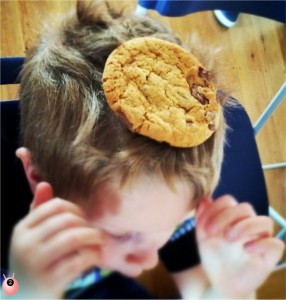 For children with Sensory Processing Disorder parties are a whole different ball game. I am so proud of how far my Sensory Seeker has come with coping with them. In fact I would go as far to say that at the last party the parents who do not know him would never have thought that he has any additional needs at all. There were signs there (a bit of spinning on the floor and ok maybe the rubbing a cookie on his head) but nothing that couldn’t be put down to a quirky five year old. Of course the problems can change from child to child with Sensory Processing Disorder, and the same child at different times, dependent on whether they are seeking or avoiding, and which areas affect them.
For children with Sensory Processing Disorder parties are a whole different ball game. I am so proud of how far my Sensory Seeker has come with coping with them. In fact I would go as far to say that at the last party the parents who do not know him would never have thought that he has any additional needs at all. There were signs there (a bit of spinning on the floor and ok maybe the rubbing a cookie on his head) but nothing that couldn’t be put down to a quirky five year old. Of course the problems can change from child to child with Sensory Processing Disorder, and the same child at different times, dependent on whether they are seeking or avoiding, and which areas affect them.
I asked for advice from the experts of Sensory Processing Disorder – that is parents and those who have SPD themselves, through Facebook groups and Twitter, on how to prepare your child for a party and how to plan one yourself when consider the child with Sensory Processing Disorder.
You need to consider whether the child is an Avoider or a Seeker
Remember that your child can fit into both of this categories for the different Sensory areas, or at different times.
The Avoider
If you have a Sensory avoider they may not be interested in attending parties at all. They may be anxious before they even get there and then not even want to join in with the party. The Avoider may not eat, want to leave their parent’s side and become easily upset. They may not like the noise, colours, the crowds, the stimulations.
How to help an Avoider with Parties
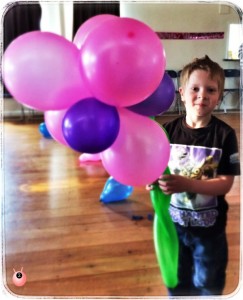 Talk to the child about the party and what to expect in the days leading up to it. If possible show them visual aids to familiarise themselves with the venue, or read books about parties. You may need to take ear plugs/defenders and/or sunglasses to help block out the lights and sounds.
Talk to the child about the party and what to expect in the days leading up to it. If possible show them visual aids to familiarise themselves with the venue, or read books about parties. You may need to take ear plugs/defenders and/or sunglasses to help block out the lights and sounds.
If it is not your party then make sure the host is aware of your child’s needs. If it is your child’s party then make sure you have means for the primary caregiver to stay with the child (helping with anxiety/safety and encouraging them to join in) and that you have enough help from others to ensure that the other guests can be looked after.
The Avoider may be upset at little things, so keep it simple. Make things quiet, avoid balloons, flashing lights, loud music/noise, just whisper Happy Birthday and have no singing or fuss, as it may be too much for the sensitive auditory system. A small party is easier to control. They may not eat so make sure you have the food they are most likely to eat. Give them a separate quiet room for them to go to.
The Seeker
May want all the stimulations – lots of balloons, colours, sounds, but over stimulate themselves. Or they may like the feel but be scared of the noise when they go pop. They may become over hyped up and excitable, want to touch everything/everyone, may be spinning all over the place and knocking into other people, jumping on balloons trying to make them burst.
My Sensory Seeker can get a bit hyper about when the party is as he has very little understanding of time. What we found worked is that he has “party clothes” and he now understands that we leave for the party after he has got changed into them. Luckily we have never had a problem entering a party as he is a Seeker – he loves the noise, the colours, and atmosphere, always wanting MORE, MORE, MORE. Now his patience and attention has increased he is able to join in with the party games, but a party that has structure is much better for him.
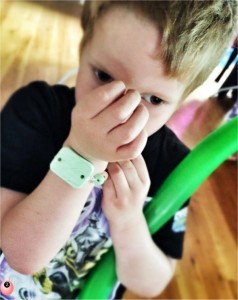 What we do need to be careful is that he does not get too over stimulated. He seems to self-regulate himself now by doing things such as spinning on the floor. I still have to watch that he doesn’t invade other children’s space too much, or if he spins on the floor that there’s room and he’s not going to trip people up. As I mentioned he has trouble visually seeing food he wants but cannot have. To be fair to him he has developed loads in this area and does no longer grab it, I do see him being more anxious/worked up due to it though. I also need to make sure that he does not put too much food into his mouth at once (stuffing). What food is available can be an issue but there’s usually something unhealthy that he will like (typical birthday food either sandwiches and biscuits or chips). He can be a bit messy and try to pile too much food on his plate. I just supervise him and make sure I take him to wash his hands (you could also take wipes but we are trying to encourage him to move forwards and feel he has an association with babies with them). Plenty of sweets throughout really help him as it gives him something oral he can touch and taste.
What we do need to be careful is that he does not get too over stimulated. He seems to self-regulate himself now by doing things such as spinning on the floor. I still have to watch that he doesn’t invade other children’s space too much, or if he spins on the floor that there’s room and he’s not going to trip people up. As I mentioned he has trouble visually seeing food he wants but cannot have. To be fair to him he has developed loads in this area and does no longer grab it, I do see him being more anxious/worked up due to it though. I also need to make sure that he does not put too much food into his mouth at once (stuffing). What food is available can be an issue but there’s usually something unhealthy that he will like (typical birthday food either sandwiches and biscuits or chips). He can be a bit messy and try to pile too much food on his plate. I just supervise him and make sure I take him to wash his hands (you could also take wipes but we are trying to encourage him to move forwards and feel he has an association with babies with them). Plenty of sweets throughout really help him as it gives him something oral he can touch and taste.
Planning a Party for a Child with Sensory Processing Disorder
Party Size and Location
When determining the party location you need to consider the time of year (indoors or outdoors), the number of guests you would like (think about whether the child will be under or overwhelmed and how many you can cope with), whether your child needs plenty of space to move around/a small quiet party – as well as your budget. Also will the other guests need someone to stay and supervise them? Are there any access requirements for the Birthday child or their guests? Also consider their developmental ages and abilities as to a venue’s suitability. If there is food included with the venue then does it meet the needs of the party guests?
Party Food
Personally parties where the food is brought out when it is ready to be eaten suits us better, and it also means that Avoiders will not have the foods’ smells. Also we find cold food is better, as it is dry and not touching. Again you need to consider what the Sensory issues are in regard to the food on making decisions about it, such as whether it is hot or cold, textures and smells. Be careful when it is dished out – my son loves burgers and ketchup but when someone else put his burger in the ketchup he would not eat it.

Time, Duration & Calming down
Consider the time of day of the party, how long your child can handle the sensory input and somewhere/something to help calm them down afterwards. If the child cannot cope with stimulation for long consider having a shorter party. You may want a morning party because the child is anxious about the wait, or you may want a late afternoon party so that it is not long until bedtime.
To help settle down at the end of the party you could put on a film, have an area for playing with Lego, doing some craft or colouring: Use stickers and wax crayons to avoid sensory seekers eating the glue and licking the paint. Or the best calming device we have found technology! (DS or tablet). Or extra stimulus may be needed – such as an obstacle course, a dancing competition, lots of pressure/bear hugs/back rubs.
Party Entertainment & Decoration
The needs of the child with Sensory Processing Disorder are going to greatly determine what kind of party you have, what the entertainment and decorations is going to be like.
To engage the child and keep their attention, whether an Avoider or Seeker, utilising their interests is helpful.
“Does the birthday girl or boy have a love of something – anything… we had a London Bus party one year. Everyone got to take home a beaker, toy bus and pencil crayons.” RosyandBo
A Sensory Seeker is more likely to want music, bouncy castles, a place to run around, lights, balloons, lots of games (musical chairs/statues/bumps) – and so on. Consider the physical abilities of the child (fine and gross motor skills, physical abilities, spatial awareness, developmental ability to cope with losing).
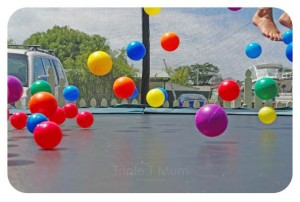
Whilst the Avoider is more likely to prefer quite, calm maybe a craft party, with little stimulus. Use plain paper for pass the parcel to make it less visually stimulating and easier to understand which layer is being unwrapped. Use a small amount of tape so it is easy to undo. Keeping the music/passing short to avoid distractions/over stimulation.
See Triple T Mum’s Bubble theme decorations
Ideas to focus the Party
Sensory Seekers want more more more utilise what they are interested in:
Dinosaurs, Superheros, Farm, Neverland, Cooking party, bouncing (castle or trampoline), swimming party, a scavenger hunt, art & craft – have a face painter. We sometimes find our Sensory Seeker does not want the feel of paint on his face or then has to rub it everywhere – we find a cheek or even better his arm suits his needs best.
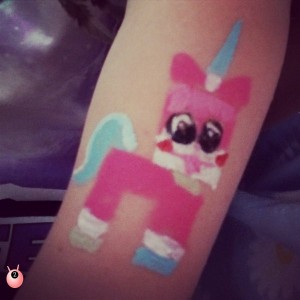
For the Sensory Avoider how about a calm Movie party – with pillows and blankets laid out with a quiet film. Or a Colouring party with colouring in tablecloths or placemats, or just pictures. For more tips on a Simple Party.
Do you have any party ideas? Or more tips on helping with a Party with a Child with Sensory Processing disorder?
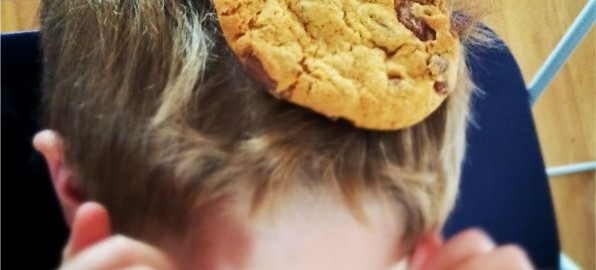
Parties have always been a real struggle for our ASD girl. More of an Avoider, she’s not good with over-stimulation, loud noises, not winning and not being first etc. Some structure is good, but not too much – she had a meltdown recently when she was expected to do the warm-up before the gym party and couldn’t pull herself back from that. I’ve lost count of the parties we’ve had to leave early. Sometimes though she can miraculously cope with all of the above (very rarely) – if she’s in a really good mood and feeling strong I guess! We’re lucky that she does still get invites at the mo, but once into Junior school she will no doubt get a lot less, which will be difficult to explain to her 🙁 I’m dreading her own party in 3 weeks time, as it has to live up to her expectations, which are mostly in her head as she’s not great at voicing them… :/ oh what fun!
Fingers crossed her party goes well. I think in Juniors then people focus more on having just a couple of friends, so if it does happen it would be easier to explain it as nothing personal – but fingers crossed it doesn’t.
My son is an avoider when he is feeling anxious, but mainly a seeker. Arriving at a party is a big stress for him and he often stands next to me with his hands over his ears. Once he eases in to the party he goes wild, and doesn’t stop until it is time to come home.
I am always on edge though because the smallest thing can flip him back to being an avoider, if that makes sense.
Fabulous post and some great advise, we have only been to 2 parties so far but I will be bookmarking this for his next party invite
I am glad he is able to enjoy the party. It is nice to hear that this post may be useful – please do pop back if you discover any further tips (or even problems) at future parties.
That was a really interesting read. Monkey is very shy and doesn’t cope well with new situations, he would definitely fit into the Avoider slot. #SSAA
My son was and still is a mixture of all these emotions at parties , it is hard .
Great tips which will help many
Some fantastic information! It’s easy just to let the kids get on with it and dole out crisps and sandwiches – some great tips though to take everyone into consideration! 🙂 x
Thanks for sharing all this useful information x
Some good advice!
Great advice for both sides of the coin, Tigger is more of an avoider and I will be bookmarking this page to re-read whenever he is invited to another party
What a great post. I can imagine parties would be a minefield for children and parents alike, and the tips here are just fantastic!
Some really useful tips to include everyone – thank you for sharing!
My son really doesnt enjoy loud parties, when he was young I used to feel sad that he didnt want to have a birthday party, but then I figured he was happy so why was I worried! As he has got older he has started celebrating by inviting one or two friends out on an activity, he finds smaller groups much easier than full on parties. He has been to other peoples parties over the years, and has even enjoyed some of them- but it is definitely not his natural habitat!
for me its always me feeeling nervous at parties not the kids they love it , but i get all panicky , think its too much noise and people x
A really helpful and insightful post. Thank you for sharing. x
Never even realised some of these things. Very interesting.
Very interesting and helpful post. Well done lady for explaining all this!
Some excellent tips here – things I would never have eeven thought of but so important to make sure that everyone’s included x x
This was a really interesting read. My 3yo really doesn’t like to be over-stimulated and she HATES being made to sing happy birthday… parties can be a bit of a minefield. I’m keeping all this advice in mind.
This isn’t a subject I know a lot about but I find it so interesting reading your blog, it really helps with my understanding.
This is fantastic and so detailed. In fact I find lots of these tips helpful for any party but it also highlights the care and attention that goes into putting together a successful party for a child with additional needs xx
This is an interesting and informative post.I did not know such a condition existed.Thanks for bringing awareness to it.
This is a great post, I must tell a friend to visit your site, so much here she’d find useful
great tips ….. parties can be stressful!
I don’t know much about this, but some seems some great tips here for everyone!
A fascinating read which has actually helped me to better understand the behaviours of some children at parties we’ve been to lately. Thanks Joy x
Not just a fabulous post but an enormous Linky with other ideas and further research
My son’s always hated loud noises but loves the lights and crinkles and such when we’ve been in sensory play rooms, which I loved to – my perfect world. Now he’s a teenager and just hates the world and loves XBox. Though he hates being identified as ‘different’ in any way, I always spot his tells. He’s just a young man with autism now as opposed to a child with autism.
My teenager has Aspergers and cannot even see himself as different now I don’t think – which can only be a good thing right 🙂
This is such a detailed and informative post.
What an interesting read, it isn’t a situation I have been in myself but it is always good to learn a little just in case 🙂 x
Wow, your posts are so comprehensive and informative.
Aaron’s nearly four, and I still can’t convince him to get his face painted he just won’t have it.
Thanks for a great read. Liska
Some really interesting points. Not somethingi have to consider with my own kids but definitely something to bare in mind for the future when they have schoolfriend parties!
Children’s parties can be so noisy and chaotic. No wonder some kids are “avoiders” and find it all so overwhelming. I find some of them a nightmare – heaven knows how it all appears through the eyes of a little person.
One of 6yo’s friends is an avoider. We find the best way around this is to get to the party, say Happy Birthday, give present and then leave the room again. She then returns when she feels happy.
There is so much to think about when planning! Great tips, thank you for sharing x
This is really interesting – we went to a party a few weeks back where all the kids joined in and had fun, yet the birthday girls just stood and watched, totally overwhelmed!
These are great tips, thank you for sharing… so many things to consider…
I love the idea of a calm movie party with lots of snuggly blankets! x
Many great tips! My son gets so nervous about parties that he often does not go. He’s ok with smaller parties but larger ones, he finds very difficult. These tips will help us. Thanks.
What a great post, filled with some great ideas. Ethan is a sensory seeker, in most areas, so it’s nice to read about your experience with it. He has only just turned 4 and we had a quiet day, I’m already thinking what do we do about a 5th birthday. Hopefully now that he has a place in a special school there won’t be that much pressure.
Thanks for linking up with Small Steps Amazing Achievements :0)
x
THANK YOU!!! That is the best explanation that I have ever read. I am a private tutor, teaching a huge variety of SEN children with a huge variety of “challenges”.
So glad it was of help. There is a post on helping at school on here too.